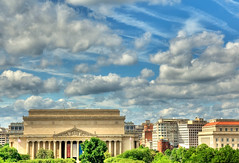The other thing bothering me about the DC City Council proposals/legislation on parking
(HDR image of clouds above DC by Eugene.)
Is that they are focused on "outsiders" while giving residents a free ride and encouraging driving.
See the "Curbside Parking Management Proposal," from the Councilmember Tommy Wells website, and "Council weighs taxing free employee parking," from the Examiner. The curbside parking management proposal has been enacted.
2. My transportation wish list said this about parking:
Speaking of parking and curbside management, change the residential parking permit system in DC to one that emphasizes the privilege, rather than the right, to park. 40% of the people in DC do not own cars. Why should the 60% that do be privileged with practically free parking spaces?
a. Residential parking permits should cost a lot more generally. As you probably know, Prof. Shoup estimates that the value of the public space on the street is about $1800 annually.
b. There should be a limit on how many residential parking permits can be issued per household. Only one car can fit in front of a typical rowhouse. Multiple cars per household should be discouraged.
c. The rate for residential parking permits should go up considerably for each additional permit per household address.
d. Parking permit rates should be weighted according to how large a car is, and its carbon footprint (maybe). One of the big problems I'd say anecdotally is that people in the city may only be buying one car, but it is much much larger than it used to be (an SUV). This further reduces available parking inventory for residents.
The Ford F-350 is wider than the typical Capitol Hill rowhouse.
3. A DC Residential Parking Permit costs $15/year. And there are big swathes of the city where you can park in neighborhoods without even needing a permit.
4. There is an informal e-list of a few of us (mostly DC people) discussing urbanism, one person wrote yesterday, about New York City, but virtually everything he says is applicable to DC (italic emphasis added):
New York does too much to encourage driving. They underprice access to road space and public parking spaces in dense parts of the city. Personal driving from one location to another in Manhattan is an extravagant use of valuable real estate. Right now it’s rationed by congestion; which is wasteful since lost time is not a gain to anyone. It should be rationed by price, which is a benefit to someone, and can be used to reduce other taxes and/or improve services.
New York charges only $1.50 an hour for curb parking. The going rate for private parking, needless to say, is a lot more. The market-clearing price would likely be between $5 and $15 per hour. NYC should raise on-street rates to whatever yields 85-90%% occupancy, vary the rates by time of day and day of week, and eliminate time restrictions (no longer necessary to encourage turnover if the rates are market-clearing). Circling-related traffic congestion would end, which might provide room for expanded sidewalks or streetscaping where needed.
New York lets residents park free in many areas of Manhattan and dense parts of Brooklyn . That should be ended; all on-street spaces should be paid at a market-clearing rate and made available to all with no time limits. “All may park, all must pay”.
Revenues from parking should be returned to the neighborhood through BIDs or parking benefit districts, or local property tax abatements. Free parking is a major subsidy for auto ownership, especially where land prices are as high as they are in Manhattan.
Paid parking will also change the political dynamic of new development. Rather than opposing new commercial development to protect their free parking, the neighbors will welcome the added revenue, much of which will come from people who don’t live in the neighborhood.
City agency use of on-street parking spaces should be paid at the same rate as the general public. It should come out of the budget of the agency using the space. City agencies will then have an incentive to economize their use of on-street space. ...
Parking pricing is not the whole solution. London-style congestion tolling is also needed, but pricing parking correctly would be a major step in the right direction. ...
Whatever scarce road space Manhattan has available should be used for necessities and high-value uses such as deliveries, taxis, and police/fire/EMS/utilities, or space-efficient modes such as walk, bike, and bus.
That's the goal. We aren't there yet.
5. Also see Vehicle Registration and Title Fees (DC) and Rates of Vehicle Excise Duty (UK).
Labels: car culture, parking, transportation demand management, transportation planning, transportation supply management




0 Comments:
Post a Comment
<< Home